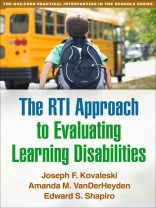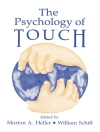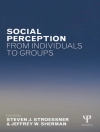This book presents clear-cut procedures for using response to intervention (RTI) to determine a K-12 student’s eligibility for special education under the designation of specific learning disabilities (SLD). Comprehensive guidelines are provided for gathering student data in the course of interventions and ruling out causes other than SLD for academic problems. Special features include case examples, tips for creating individualized education plans based on RTI data, and frequently asked questions. With a convenient large-size format and lay-flat binding, the book features useful reproducible tools. Purchasers also get access to a Web page where they can download and print the reproducible materials. This book is in The Guilford Practical Intervention in the Schools Series, edited by T. Chris Riley-Tillman.
Mục lục
Introduction1. Historical and Legal Background for Response to Intervention2. Implementing RTI as School Reform: Instructional Prerequisites for Using RTI for Eligibility Decision Making 3. Determining Inadequate Academic Achievement4. Determining Rate of Improvement5. Ruling Out Other Conditions6. Ruling Out Inadequate Instruction7. The Observation Requirement8. Parent Involvement in an RTI System9. Determining Eligibility for Special Education: Pulling All the Pieces Together in a Comprehensive Evaluation10. Using RTI Data to Build an IEP11. Frequently Asked Questions about RTI and SLD
Giới thiệu về tác giả
Joseph F. Kovaleski, DEd, is Professor of Educational and School Psychology and Director of the Doctoral Program in School Psychology at the Indiana University of Pennsylvania. He serves on the Advisory Board of the RTI Action Network at the National Center for Learning Disabilities (NCLD) and on the Editorial Board of School Psychology Review. In 2005, Dr. Kovaleski, with Edward S. Shapiro, initiated RTI in Pennsylvania through the Pennsylvania Training and Technical Assistance Network. He has published articles, book chapters, and Web-based content on RTI and other topics related to school reform and school psychology. Amanda M. Van Der Heyden, Ph D, is a private consultant, researcher, and national trainer who has worked in a number of school districts and is President of Education Research and Consulting, Inc., in Fairhope, Alabama. She serves on the Advisory Board of the RTI Action Network at the NCLD and is also a member of the NCLD’s Education Programs Committee and a panelist at the Institute for Education Sciences, U.S. Department of Education. Dr. Van Der Heyden received the Lightner Witmer Early Career Contributions Award from Division 16 (School Psychology) of the American Psychological Association (APA). She is Associate Editor of School Psychology Review and has published numerous articles and books related to RTI. Edward S. Shapiro, Ph D, until his death in 2016, was Director of the Center for Promoting Research to Practice and Professor in the School Psychology Program at Lehigh University. Best known for his work in curriculum-based assessment and nonstandardized methods of assessing academic skills problems, Dr. Shapiro was author or coauthor of numerous books. He also developed the widely used BOSS (Behavioral Observation of Students in Schools) software system and presented papers, chaired symposia, and delivered invited addresses at conferences around the world. Dr. Shapiro’s contributions to the field of school psychology have been recognized with the Outstanding Contributions to Training Award from Trainers of School Psychologists, the Distinguished Contribution to School Psychology Award from the Pennsylvania Psychological Association, the Eleanor and Joseph Lipsch Research Award from Lehigh University, and the Senior Scientist Award from the Division of School Psychology of the American Psychological Association, among other honors.












